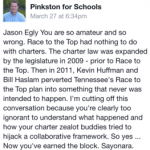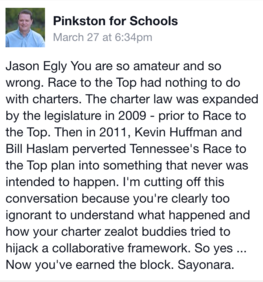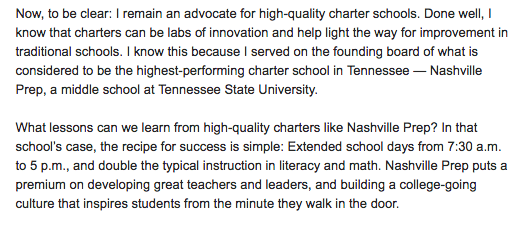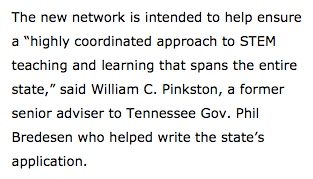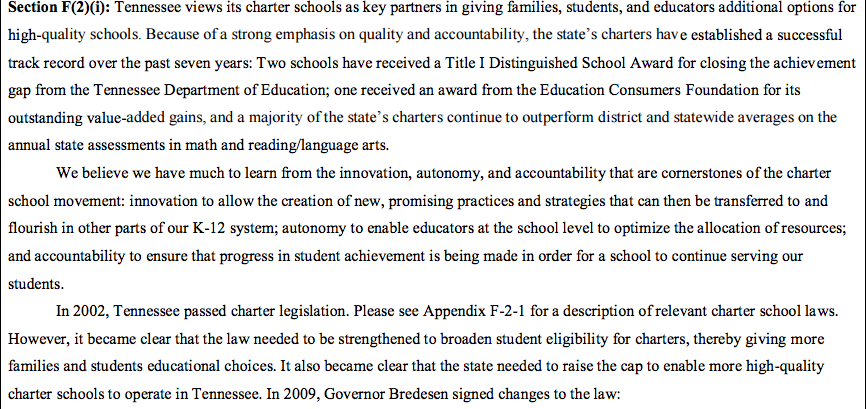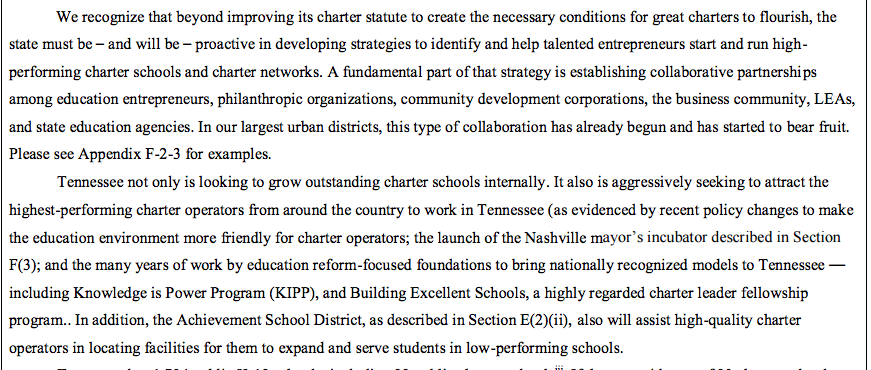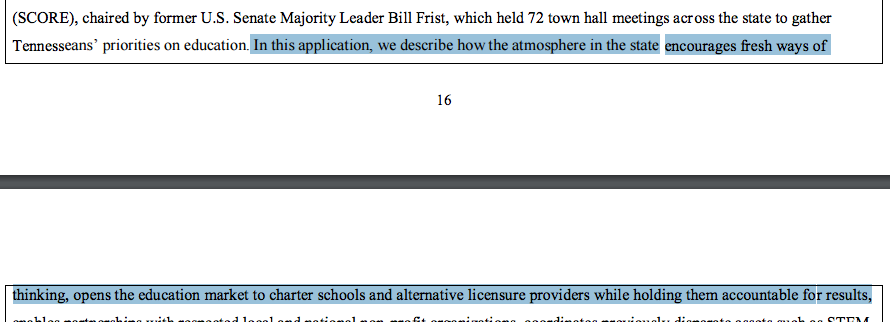This morning, School Board Member Amy Frogge released a statement about Project Renaissance/Nashville Rise on her Facebook page in response to a video that was released by Phil Williams that reveals the funding behind the organizations. Phil Williams reports the Scarlett Foundation as a major funder for Project Renaissance.
Amy Frogge states in her Facebook post, “… we do know that the group is funded in part by the Scarlett Foundation, a pro-charter/voucher group that is tied to the Beacon Center and the American Legislative Exchange Council.”
Additionally, Amy Frogge, without any evidence whatsoever, threw out another baseless allegation that her opponent, Thom Druffel, was recruited by Project Renaissance.
First, Project Renaissance/Nashville Rise is a 501 c3 organization. By definition, they cannot contribute money on any election activities. They are only focusing on parent engagement, including hosting forums to get parents engaged. As a matter of fact, it was the parents of Nashville Rise that voted to do the forum, not Project Renaissance.
Amy Frogge, Will Pinkston, and Jill Speering are not attending this event. Don’t let Amy Frogge’s post make you think it was this Phil Williams report that caused them to drop out. These decisions were already made before this piece was released.
The Investigation
In fact, we see that this “investigation” by Phil Williams came at the request of Will Pinkston, to whom Phil Williams only referred to as “an unnamed board member” in his piece. Emails obtained by Tennessee Education Report show Will Pinkston added 13 members of the press to his emails with Nashville Rise on June 9th.
Before Pinkston decided to attend the event, he wanted Nashville Rise to answer a variety of questions, including, “Of those parents who are part of the coalition, how many are residents of my School Board District 7 and what schools do their children attend?”
I find it strange that Will Pinkston wants to know the specific schools parents send their children to. He is a representative of all District 7, not just parents who send their children to schools he approves of. Does Will Pinkston treat parents differently if they send their students to JT Moore, Valor, or Harpeth Hall? If so, he does not deserve to be an elected official.
When reached by Tennessee Education Report, Nashville Rise released the following statement:
“On May 10th, we invited all school board candidates on the August 2016 ballot to participate in a city-wide, parent-led forum. Our hope was to have all candidates in attendance, so that parents could engage with them and make informed decisions about the race. We gave candidates a deadline for notifying us of participation. That deadline was June 13th at noon. Prior to the deadline, every candidate with the exception of Will Pinkston had responded. Jill Speering, who initially RSVPd that she planned to participate, notified us prior to the deadline that she would now be out of town. Amy Frogge declined our invitation. All other candidates, with the exception of Mr. Pinkston, plan to participate.”
Slippery Slope
If school board candidates start down the path of not attending events because of the organization’s funding, they will not be able to attend any events by the organizations listed below.
In the same 990 that shows that the Scarlett Foundation gave $250,000 to Project Renaissance, it also shows that they gave to many other organizations including Metro Nashville Public Schools, Conexion Americas, Communities in Schools, and United Way for the Read to Succeed program.
That means Will Pinkston couldn’t hold another campaign kickoff event at Conexion Americas, Amy Frogge couldn’t attend an event about wrap around services through Communities in Schools, and Jill Speering couldn’t attend a Read to Succeed event.
Are these school board members ready to go down this slippery slope? Should people boycott all of these nonprofits? Pinkston himself has touted the incredible work of Conexion Americas, and rightfully so. Frogge has been one of the largest advocates of Communities in Schools, and rightfully so.
Will Pinkston says that these organizations below should “return the dirty money.” Is that really what we want? I hope not because returning money will hurt the students of Nashville.
As someone who has put together a mayoral forum in the past, the goal is to get a moderator who is a member of the press in order to maintain impartiality. That’s what Nashville Rise has done. In good faith, they got David Plazas to moderate. Plazas has experience moderating many forums in Nashville, including a few mayoral forums last year.
Scarlett Foundation Funders
While the Scarlett Foundation gives to plenty of charter schools, they also give to a wide variety of nonprofits in Nashville that are making a huge difference in the lives of students in Nashville.
Here are some organizations that have received funding:
Almost 70 students have received tuition scholarships from the Scarlett Foundation
Metro Nashville Public Schools – $222,566 – Support program
Conexion Americas -$100,000 – Support of Parents as Partners Programs in MNPS
Oasis Center – $150,000 – Support for Nashville College Connection
Big Brothers Big Sisters – $50,000 – Support Programs
United Way of Middle Tennessee – $312,450 – Purchase Read to Succeed Program
United Way of Middle Tennessee – $35,000 – Books for Imagination Library
Book’em – $30,000 – Purchase new books for reading is fundamental programs
Backfield in Motion – $35,000 – Support for educational supplies for tutoring program for boys ages 10-18
Girl Scouts – $15,000 – Support of college access and college tutor program
Homework Hotline – $29,250 – Cost of middle school tutoring
Junior Achievement – $30,000 – Support “company program”
Martha O’Bryan Center – $80,000 – Thrive – Top Floor Zone
Nashville Adult Literacy Council – $50,000 – Support drop-in learning center to help adults learn to read
Pencil Foundation – $6,000 – Expansion of the reading partners program
Preston Taylor Ministries – $10,000 – Support afters chool program
Communities in Schools – $50,000 – Support for site directors at MNPS schools
Nashville Public Library Foundation – $53,043 – Support full time reading specialist
American Education Assistance Foundation – $125,000 – Support for Tennessee Promise Scholarship
There are other deserving organizations that do incredible work that are funded as well, but these are just a few. Like I said, charter schools in Nashville have been funded by this organization, but it’s not just an organization that gives only to charter schools. To me, it looks like an organization that cares about students. I love that we have a grant making organization that supports organizations in Middle Tennessee.
To discredit Nashville Rise because of their association with this generous foundation is unjustified from elected officials who say they are doing what’s best for students in Nashville.
Update (6/15): Will Pinkston has responded to the post by calling me a “nitwit” and stating my attacks on him are “kind of like powder puffs or a tickle fight. 😉“
